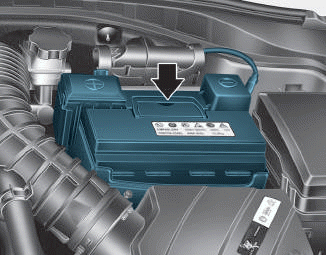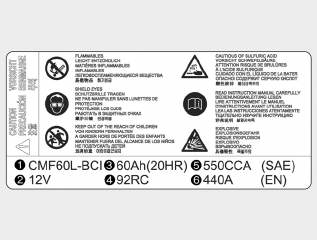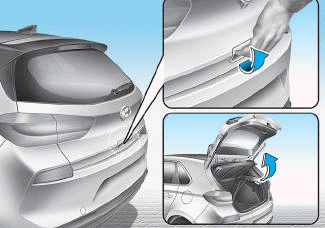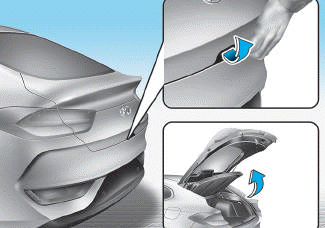Hyundai i-30: Maintenance / Battery
WARNING
To prevent SERIOUS INJURY or DEATH to you or bystanders, always follow these precautions when working near or handling the battery:

Always read and follow instructions carefully when handling a battery.

Wear eye protection designed to protect the eyes from acid splashes.

Keep all flames, sparks, or smoking materials away from the battery.

Hydrogen is always present in battery cells, is highly combustible, and may explode if ignited.

Keep batteries out of reach of children.

Batteries contain sulfuric acid which is highly corrosive. Do not allow acid to contact your eyes, skin or clothing.
If acid gets into your eyes, flush your eyes with clean water for at least 15 minutes and get immediate medical attention. If acid gets on your skin, thoroughly wash the area. If you feel pain or a burning sensation, get medical attention immediately.
- When lifting a plastic-cased battery, excessive pressure on the case may cause battery acid to leak. Lift with a battery carrier or with your hands on opposite corners.
- Do not attempt to jump start your vehicle if your battery is frozen.
- NEVER attempt to recharge the battery when the vehicle’s battery cables are connected to the battery.
- The electrical ignition system works with high voltage. NEVER touch these components with the engine running or when the ignition switch is in the ON position.
NOTICE
- When you do not use the vehicle for a long time in a low temperature area, disconnect the battery and keep it indoors.
- Always charge the battery fully to prevent battery case damage in low temperature areas.
NOTICE
If you connect unauthorised electronic devices to the battery, the battery may be discharged. Never use unauthorised devices.
For best battery service

- Keep the battery securely mounted.
- Keep the battery top clean and dry.
- Keep the terminals and connections clean, tight, and coated with petroleum jelly or terminal grease.
- Rinse any spilled electrolyte from the battery immediately with a solution of water and baking soda.
- If the vehicle is not going to be used for an extended time, disconnect the battery cables.
Battery capacity label

The actual battery label in the vehicle may differ from the illustration.
1. CMF60L-BCI : The HYUNDAI model name of battery
2. 12V : The nominal voltage
3. 60Ah(20HR) : The nominal capacity (in Ampere hours)
4. 92RC : The nominal reserve capacity (in min.)
5. 550CCA : The cold-test current in amperes by SAE
6. 440A : The cold-test current in amperes by EN
Battery recharging
By battery charger
Your vehicle has a maintenance-free, calcium-based battery.
- If the battery becomes discharged in a short time (because, for example, the headlights or interior lights were left on whilst the vehicle was not in use), recharge it by slow charging (trickle) for 10 hours.
- If the battery gradually discharges because of high electric load whilst the vehicle is being used, recharge it at 20-30A for two hours.
WARNING
Always follow these instructions when recharging your vehicle’s battery to avoid the risk of SERIOUS INJURY or DEATH from explosions or acid burns:
- Before performing maintenance or recharging the battery, turn off all accessories and place the Engine Start/ Stop button to the OFF position.
- Keep all flames, sparks, or smoking materials away from the battery.
- Always work outdoors or in an area with plenty of ventilation.
- Wear eye protection when checking the battery during charging.
- The battery must be removed from the vehicle and placed in a well ventilated area.
- Watch the battery during charging, and stop or reduce the charging rate if the battery cells begin boiling violently.
- The negative battery cable
must be removed first and
installed last when the battery
is disconnected. Disconnect
the battery charger in the following
order:
(1) Turn off the battery charger main switch.
(2) Unhook the negative clamp from the negative battery terminal.
(3) Unhook the positive clamp from the positive battery terminal. - Always use a genuine HYUNDAI approved battery when you replace the battery.
CAUTION
AGM battery (if equipped)
- Absorbent Glass Matt (AGM) batteries are maintenancefree and we recommend that the AGM battery be serviced by a HYUNDAI authorised repairer. For charging your AGM battery, use only fully automatic battery chargers that are specially developed for AGM batteries.
- When replacing the AGM battery, we recommend that you use parts for replacement from a HYUNDAI authorised repairer.
- Do not open or remove the cap on top of the battery. This may cause leaks of internal electrolyte that could result in severe injury.
By jump starting
After a jump start from a good battery, drive the vehicle for 20-30 minutes before it is shutoff. The vehicle may not restart if you shut it off before the battery had a chance to adequately recharge. See “Jump Starting” in chapter 6 for more information on jump starting procedures.
Information
An inappropriately disposed battery can be harmful to the environment and human health.
Dispose of the battery according to your local law(s) or regulations.
Reset items
The following items may need to be reset after the battery has been discharged or the battery has been disconnected.
- Auto up/down window
- Sunroof
- Trip computer
- Climate control system
- Driver position memory system
- Clock
- Audio system
 Wiper blades
Wiper blades
Blade inspection
Contamination of either the windscreen
or the wiper blades with foreign
matter can reduce the effectiveness
of the windscreen wipers...
 Tyres and wheels
Tyres and wheels
WARNING
Tyre failure may cause loss of
vehicle control resulting in an
accident. To reduce risk of
SERIOUS INJURY or DEATH,
take the following precautions:
Inspect your tyres monthly for
proper inflation as well as
wear and damage...
Other information:
Hyundai i30 (PD) 2018-2025 Service Manual: Tire
Repair procedures Tire Wear 1. Measure the tread depth of the tires. Tread depth [limit] : 1.6 mm (0.063 in) 2. If the remaining tread depth (A) is less than the limit, replace the tire...
Hyundai i30 (PD) 2018-2025 Service Manual: Components and components location
Components The following is the configuration of the AEB system. – Detection device (radar and camera) that can recognize potential obstacles in the front. – Human-Machine Interface (HMI) to warn driver or change settings...
Categories
- Manuals Home
- 3rd Generation i30 Owners Manual
- 3rd Generation i30 Service Manual
- Theft-alarm system
- Tyre pressure monitoring system
- Brake/clutch fluid
- New on site
- Most important about car
Tailgate
Opening the tailgate

■ 5 Door, Wagon

■ Fastback
